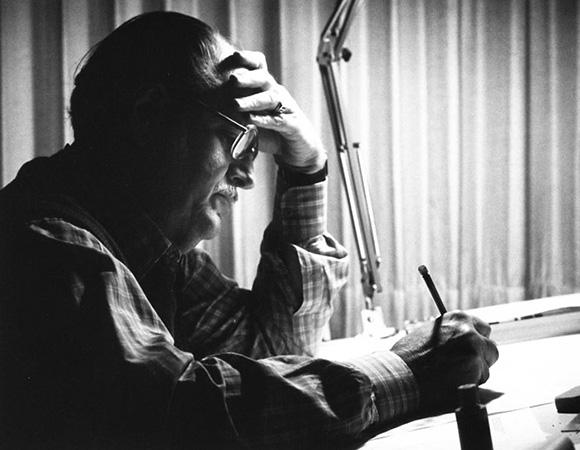Aurelio de la Vega, the world-renowned composer who taught in CSUN’s Department of Music for more than three decades, during which he was Distinguished Professor of Music and Director of the Electronic Music Studio, died February 12 of congestive heart failure. He was 96.
“Aurelio was not only a composer and a teacher of composition,” retired Curb College dean William Toutant said after learning of his friend’s death. “He was also an artist, a poet, a musicologist, an author, and a patriot. Whether he was teaching elementary undergraduate or advanced graduate classes, he personified what it is to be an artist. In his composition classes, he did not insist that students write like he did. He encouraged them to find their own voices. He taught that compositional technique is merely a means to an end. If one has nothing to say, then all the technique in the world is useless.”
“In addition to his tremendous professional accomplishments, Aurelio was a good-spirited and kind person with a sly sense of humor and a larger-than-life presence,” said Dan Hosken, Dean of the Curb College. “I met him shortly after I joined the music faculty and he was welcoming and generous with his time and his advice. Aurelio was an emeritus faculty member by then, but was still a vital part of the life of the Music Department, regularly attending concerts, many of which featured his wonderful and distinctive music. My thoughts are with his wife, singer and conductor Anne Marie Ketchum.”
Born, raised, and educated in Cuba, De la Vega permanently moved to Los Angeles in 1959, continuing to compose contemporary music as he taught at then–San Fernando Valley State College. In 1971 he received the Outstanding Professor Award for the entire CSU system. Former students and music professionals are united in citing his mentorship and inspirational support. Professor De la Vega was also deeply generous in giving back to the university he loved so much by creating the annual Aurelio de la Vega Art Music Composition Scholarship, which helps young composers like the generations he taught to pursue their artistic aspirations.
Because of his strong condemnation of the Castro regime, performance and radio transmission of De la Vega’s work was banned in Cuba for most of his life. Finally, in 2009, “Intrata” (1972), an orchestral piece commissioned by Zubin Mehta and the Los Angeles Philharmonic, was performed in Havana by the Cuban National Orchestra.
De la Vega’s standing in Los Angeles’s classical music scene was well-celebrated; his awards and recognitions too numerous to list. A 90-minute documentary about his life and work—Aurelio: Rebel with a Cause—was released in 2014 and two recent biographies are available.
For many years after his retirement, the Department of Music held a concert marking each milestone birthday: 65, 70, 75, 80, 85, 90. He was a longtime member of the Curb College’s Dean’s Council after his retirement.
De la Vega’s first wife, Sara Lequerica, died in 2009. He is survived by his second wife, soprano Anne-Marie Ketchum, artistic director of the Verdi Chorus.
Again, from Bill Toutant, “I think the final stanza of ‘The Silver Swan,’ a madrigal by Orlando Gibbons, encapsulates how many of Aurelio’s friends and colleagues feel about his passing: ‘Farewell, all joys; Oh death, come close mine eyes; More geese than swans now live, more fools than wise.’”







